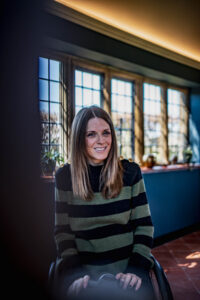May’s ‘I Love You, Man’ guest is racing driver Nathalie McGloin, who embarked on a remarkable journey after a life-changing car accident at the age of 16. This is her story.
Helmeted, suited up in fireproof overalls, and harnessed into a deep racing bucket seat, an onlooker with no prior knowledge would never know that Nathalie McGloin doesn’t quite match the outdated archetypal image of a racing driver.
It might only be when they hear the announcer say her name that they’d realise she’s female, still an underrepresented demographic across the motorsport industry despite earnest attempts to start shifting the imbalance. And it would only be if they stood near her car while it was manoeuvring round the pits that they might notice that Nathalie is driving with hand controls.
“I broke my neck in a car crash when I was 16.” That’s where Nathalie’s journey towards being the only female tetraplegic racing driver in the world begins. Tetraplegia, if you’re not familiar with your medical terminology, is paralysis that affects all four limbs. It is fundamentally life-changing, and to call it a setback would be a colossal understatement, but nonetheless, Nathalie was back finishing her A-Levels and starting university when she was out of hospital.
“I wasn’t really into any kind of sports at the time, I was a bit of a tearaway. I went to uni and started playing wheelchair rugby.” You might have seen this sport getting played in the Paralympics – it’s a shockingly visceral, full-contact wheelchair adaptation of the sport it’s named after, although it used to be known as ‘murderball’ in a nod to quite how brutal it is. The fact that Nathalie was playing this so soon after sustaining life-altering injuries should give you an idea of the sort of person she is.
“That’s how I found motorsport. I’d been doing rugby for the best part of 10 years when I was introduced to a teammate who did track days. He said that his car was faster than mine, so he invited me to a track day to see who was right. I absolutely fell in love with it. It was amazing to be able to do something that able-bodied people did in the same way, at the same time.” Cleary, it ignited something, because Nathalie was soon investigating getting a race licence, which wasn’t the simplest procedure at the time.
“The licensing process was different to how it is now. There was an extra hurdle I had to go over – I had to do four hillclimb or sprint events in order to qualify. Since I started working for Motorsport UK, we’ve changed that, because it’s expensive and not relevant to racing. Driving up a hill against the clock is not the same as racing [other] cars.
“Before I knew it, I’d bought a car and was racing.” Now, in 2023, Nathalie is about to begin her eighth racing season, competing in both the Classic Sports Car Club’s New Millennium series and races organised by the 750 Motor Club in a race-prepped 987 Porsche Cayman S, adapted with hand controls.
A point that’s frequently raised in discourse around making motorsport more inclusive, more diverse, is that it’s effectively the only sport that doesn’t force competition to be divided based on sex and bodily ability. In a car, there’s no physical gap between men and women, and the advent of hand controls means there’s no reason for disabled drivers to be at any disadvantage. So why, at race weekends from your local motor club’s sprint competition on a disused airfield to the British Grand Prix, is the paddock dominated by able-bodied men?
It’s a question that motorsport governing bodies around the world are attempting to answer, although there’s certainly some unfortunate and deep-seated historical context involved. Nathalie has some experience in trying to break down these barriers.
“I was really lucky that I was in a position to buy my own race car. If I hadn’t had those means, I just wouldn’t have been able to do it. The barriers exist for [disabled] people that either don’t have the ambition or the finances to do it themselves. You can’t just turn up to a track and do an arrive and drive or even a test session in a car with hand controls because they just don’t exist.
“There are organisations that are willing to make opportunities for disabled people, but there aren’t enough. We need more people to invest and believe in disabled people in motorsport by creating grassroots level access to the sport. There is a movement of people and organisations who want to change this and are actively starting to, but I’m impatient and want this to accelerate at a faster pace.”
They’re some of the hurdles faced by disabled racers. What about women trying to break into motorsport, when plenty of series are still engaged in the practice of using them as nothing more than ornaments in the form of grid girls?
We’ve seen a number of female-only championships emerge in recent years aiming to close the significant gulf between men and women in racing, most notably the W Series and the new-for-2023 F1 Academy. While some have praised these initiatives for giving female racers a far more visible platform, they’ve also faced some criticism for potentially worsening the perception of a disparity between men and women rather than giving them the opportunity to compete equally.
“I think the approach of women-only championships is a positive thing if the end goal isn’t segregation,” says Nathalie. “If W Series and F1 Academy attract more females into the sport and give them opportunities they wouldn’t otherwise have, I think that’s fantastic, as long as we don’t steer towards an all-female F1.”
It’s a fairly safe assumption that similar questions would arise around a disabled-only series, were it ever to materialise. Nathalie emphasises that a separate ‘para’ division of racing should definitively not be the end goal of any advocacy – it would be a redundant backwards step when, as people like Nathalie prove, disabled people can and should be able to compete on an equal level to the able-bodied.
Since getting involved in racing, Nathalie has worked on building a strong platform from which she can push for change. Spinal Track, the fantastically-named charity she established with partner and rally driver Andrew Bayliss, offers free track days and rally experiences to disabled drivers, in cars with hand controls. This is a response to the lack of opportunities for disabled drivers, whether genuinely trying to break into racing or just seeking out the adrenaline hit that track driving brings. “We ran it out of our own pockets for the first three months, and got some sponsors just at the right time. Seven years later, we now run 10 track days and 20 rally days a year.”
Nathalie is also president of the FIA’s Disability and Accessibility Commission, an internal organisation aimed at helping to break down those barriers that exist for disabled racers. “[The FIA] approached me – I was asked to do a speech at their international conference in 2017… [then-president] Jean Todt came up to me afterwards and congratulated me. I didn’t think anything of it, but I was then invited to Paris for what I thought was a consultation on disabled motorsport. It turned out they’d created the commission and were offering me the role of running it. It was absolutely crazy – I felt like I was so new in the sport, but Jean had obviously seen something in me. I was so grateful that he’d given me the opportunity, and I’ve worked hard ever since. There’s obviously now a new president, but Mohammed Ben Sulayem is just as encouraging for disabled motorsport.”
Ultimately, Nathalie is unwavering in her drive to not allow her abilities as a racing driver to be defined or overshadowed by her disability and gender: “There’s no one that looks like me in the paddock. There are hardly any females, there are hardly any disabled people, and there definitely aren’t any disabled females, but that’s never really been an issue for me. I was the only female in the country that played wheelchair rugby for a good year and a half… stuff like that doesn’t really deter me.”
Nathalie is evidence that it shouldn’t deter anyone else, either. There generally seems to be a positive shift occurring in the openness and inclusivity of motorsport around the world, but it still has a long, long way to go. People like Nathalie and the work she does are helping drive that change, but some of the impetus must still lie with the established and the complacent.
Nathalie was the guest speaker at Caffeine&Machine’s monthly ‘I Love You, Man’ talk on Monday 1 May. All ticket proceeds went to Spinal Track – if you missed the talk, you can check out the charity and make a donation here.




















